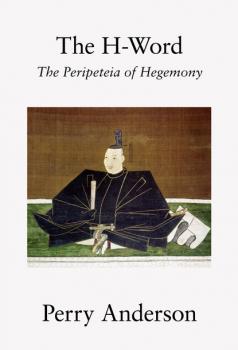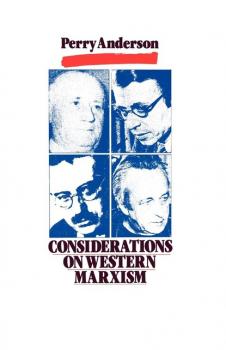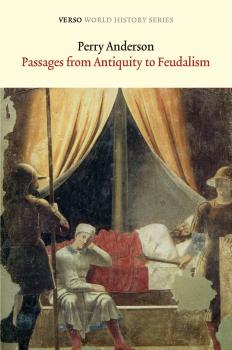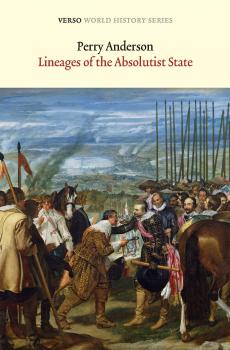ТОП просматриваемых книг сайта:
Perry Anderson
Список книг автора Perry AndersonАннотация
Wird die Gegenwart kompliziert, hilft es, einen Blick zurück zu werfen. Im Gespräch mit seinem Kollegen Perry Anderson zeichnet der Historiker Suleiman Mourad die Geschichte des Korans und des muslimischen Glaubens nach. Dass hier ein sachkundiger Mediävist und Kenner der politischen und intellektuellen Landschaft der Gegenwart Rede und Antwort steht, ist das große Glück dieses über die Dauer eines Jahres geführten Dialogs. Der Bogen spannt sich von den Anfängen des Korans über Mohammed, die sunnitisch-schiitische Spaltung, die Entwicklung des Dschihad und Reformbestrebungen bis hin zum modernen Islam und seinen heutigen Herausforderungen.
"Andersons Fragen sind präzise, prägnant und kraftvoll, Mourads Antworten klug, verständlich und unvoreingenommen. Unentbehrlich!" Le Monde
"Andersons Fragen sind präzise, prägnant und kraftvoll, Mourads Antworten klug, verständlich und unvoreingenommen. Unentbehrlich!" Le Monde
Аннотация
A fascinating history of the political theory of hegemony Few terms are so widely used in the literature of international relations and political science, with so little agreement about their exact meaning, as hegemony. In the first full historical study of its fortunes as a concept, Perry Anderson traces its emergence in Ancient Greece, its rediscovery during the upheavals of 1848–9 in Germany, and then its chequered career in revolutionary Russia, fascist Italy, Cold War America, Thatcherized Britain, post-colonial India, feudal Japan, Maoist China, through to the world of Merkel and May, Bush and Obama. The result is a surprising and fascinating expedition into global intellectual history, ending with a strong political statement about the present.
Аннотация
This synoptic essay considers the nature and evolution of the Marxist theory that developed in Western Europe, after the defeat of the proletarian rebellions in the West and the isolation of the Russian Revolution in the East in the early 1920s. It focuses particularly on the work of Lukács, Korsch and Gramsci; Adorno, Marcuse and Benjamin; Sartre and Althusser; and Della Volpe and Colletti, together with other figures within Western Marxism from 1920 to 1975. The theoretical production of each of these thinkers is related simultaneously to the practical fate of working-class struggles and to the cultural mutations of bourgeois thought in their time. The philosophical antecedents of the various school within this tradition – Lukácsian, Gramscian, Frankfurt, Sartrean, Althusserian and Della Volpean – are compared, and the specific innovations of their respective systems surveyed. The structural unity of 'Western Marxism', beyond the diversity of its individual thinkers, is then assessed, in a balance-sheet that contrasts its heritage with the tradition of 'classical' Marxism that preceded it, and with the commanding problems which will confront any historical materialism to succeed it.
Аннотация
Magisterial account of the ideas and the figures who have forged the American Empire Since the birth of the nation, impulses of empire have been close to the heart of the United States. How these urges interact with the way the country understands itself, and the nature of the divergent interests at work in the unfolding of American foreign policy, is a subject much debated and still obscure. In a fresh look at the topic, Anderson charts the intertwined historical development of America’s imperial reach and its role as the general guarantor of capital. The internal tensions that have arisen are traced from the closing stages of the Second World War through the Cold War to the War on Terror. Despite the defeat and elimination of the USSR, the planetary structures for warfare and surveillance have not been retracted but extended. Anderson ends with a survey of the repertoire of US grand strategy, as its leading thinkers—Brzezinski, Mead, Kagan, Fukuyama, Mandelbaum, Ikenberry, Art and others—grapple with the tasks and predicaments of the American imperium today.
Аннотация
A major essay on the thought of the great Italian Marxist An explosive analysis of the central strategic concepts in the thought of the great Italian Marxist, Anderson’s essay has been the subject of book-length attacks across four decades for its disentangling of the hesitations and contradictions in Gramsci’s highly original usage of such key dichotomies as East and West, domination and direction, hegemony and dictatorship, state and civil society, war of position and war of movement. In a critical tribute to the international richness of Gramsci’s work, it shows how deeply embedded these notions were in the revolutionary debates in Tsarist Russia and Wilhemine Germany, in which arguments criss-crossed between Plekhanov, Lenin, Kautsky, Luxemburg, Lukács and Trotsky, with contemporary echoes in Brecht and Benjamin. A new preface considers the objections this account of Gramsci provoked and the reasons for them.
Аннотация
The characteristic form taken by English Marxism since the war has been the study of history. No writer exemplifies its achievements better than Edward Thompson, whose Making of the English Working Class is probably the most influential single work of historical scholarship by a socialist today. An editor of The New Reasoner in 1957–59, a founder of the New Left in 1960, now an eloquent champion of civil rights, Thompson has most recently aroused widespread interest with the appearance of his Poverty of Theory, which combines philosophical and political polemic with Louis Althusser, and powerful advocacy of the historian’s craft. Arguments Within English Marxism is an assessment of its central theses that relates them to Thompson’s major historical writings themselves. Thus the role of human agency—the part of the conscious choice and active will—in history is discussed through consideration of its treatment in The Making of the English Working Class. The problems of base and superstructure in historical materialism, and of affiliation to values in the past, are reviewed in the light of Whigs and Hunters. The claims of utopian imagination are illustrated from the findings of William Morris. Questions of socialist strategy are broached in part through the articles now collected in Writing by Candlelight. Exploring at once differences and convergences between New Left Review and one of its founders, the essay concludes by suggesting the virtues of diversity within a common socialist culture.
Аннотация
How Marxist thought evolved in the seventies and early eighties. What have been the major changes in the intellectual landscape of the left since the mid seventies? Have they on balance represented an emancipation or a retreat for socialist culture as a whole? In the Tracks of Historical Materialism looks at some of the paradoxes in the evolution of Marxist thought in this period. It starts by considering the remarkable and variegated growth of historical materialism in the Anglo-American world, spreading across a broad field from history to economics, politics to literature, sociology to philosophy. By contrast, the same years have seen a drastic recession of Marxist influences in the Latin cultures where it was traditionally strong—France or Italy. Its main theoretical challengers there proved to be successive forms of structuralism and post-structuralism. The common coordinates of these—tracing the outer bounds of the work of Levi-Strauss or Lacan, Foucault or Derrida—are surveyed and criticized, in the light of the inherent limitations of the language model from which they derived. In Germany, on the other hand, the theoretical scene has been largely dominated by the accumulating work of Habermas, with its roots in the Frankfurt School. Yet Habermas's philosophy also reveals unexpected affinities with the trend of prevalent Parisian concerns, in its unifying emphasis on communication—while at the same time diverging from them in the constancy of its political commitments. The historical background of international class struggles against which these variant fates of Marxism in the west were played out is then explored, with special attention to the interconnection between the destinies of Maoism and Eurocommunism. What, finally, is the nature of the relationship between Marxism as a theory and socialism as a goal? A conclusion reviews the wider issues posed for the labour movement by the rise of the peace movement and the women’s movement, and suggests a range of priorities for the further development of Marxist thought in the eighties.
Аннотация
How the slave-based societies of Ancient Greece and Rome became the feudal societies of the Middle Ages. Passages from Antiquity to Feudalism is a sustained exercise in historical sociology that shows how the slave-based societies of Ancient Greece and Rome eventually became the feudal societies of the Middle Ages. In the course of this study, Anderson vindicates and refines the explanatory power of historical materialism, while casting a fascinating light on the Ancient world, the Germanic invasions, nomadic society, and the different routes taken to feudalism in Northern, Mediterranean, Eastern and Western Europe. Through this work and its companion volume, Lineages of the Absolutist State, Anderson presents a Marxist history of Western political development that takes readers from the first stirrings of political consciousness in the classical world to the rise of absolutist monarchies in Europe and the birth of the modern epoch.
Аннотация
Situating the Absolutist states of the early modern epoch against the background of European feudalism. Forty years after its original publication, Lineages of the Absolutist State remains an exemplary achievement in comparative history. Picking up from where its companion volume, Passages from Antiquity to Feudalism, left off, Lineages traces the development of Absolutist states in the early modern period from their roots in European feudalism, and assesses their various trajectories. Why didn’t Italy develop into an Absolutist state in the same, indigenous way as the other dominant Western countries, namely Spain, France and England? On the other hand, how did Eastern European countries develop into Absolutist states similar to those of the West, when their social conditions diverged so drastically? Reflecting on examples in Islamic and East Asian history, as well as the Ottoman Empire, Anderson concludes by elucidating the particular role of European development within universal history.
Аннотация
A magisterial analysis of Europe's development since the end of the Cold War. The New Old World looks at the history of the European Union, the core continental countries within it, and the issue of its further expansion into Asia. It opens with a consideration of the origins and outcomes of European integration since the Second World War, and how today's EU has been theorized across a range of contemporary disciplines. It then moves to more detailed accounts of political and cultural developments in the three principal states of the original Common Market—France, Germany and Italy. A third section explores the interrelated histories of Cyprus and Turkey that pose a leading geopolitical challenge to the Community. The book ends by tracing ideas of European unity from the Enlightenment to the present, and their bearing on the future of the Union. The New Old World offers a critical portrait of a continent now increasingly hailed as a moral and political example to the world at large.










